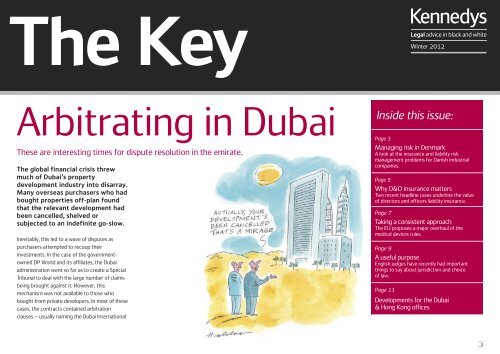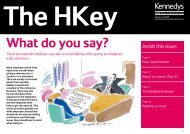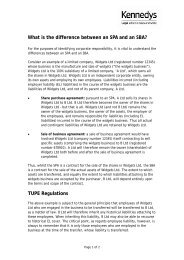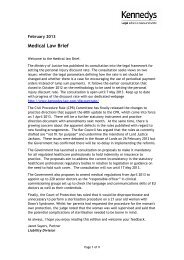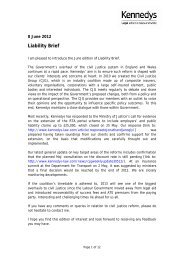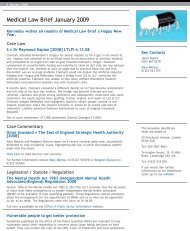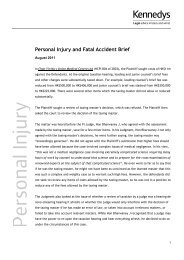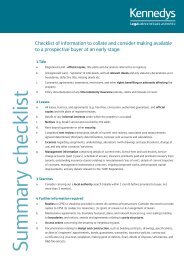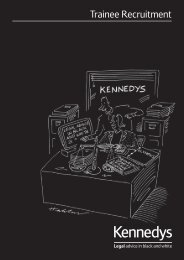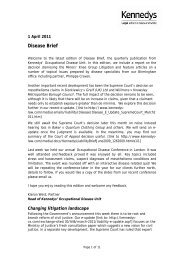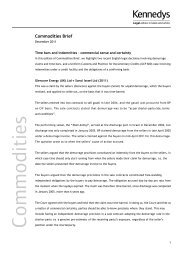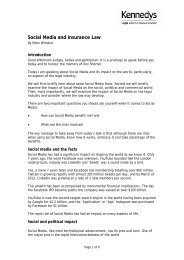Download The Key - Winter 2012 (PDF, 468KB) - Kennedys
Download The Key - Winter 2012 (PDF, 468KB) - Kennedys
Download The Key - Winter 2012 (PDF, 468KB) - Kennedys
Create successful ePaper yourself
Turn your PDF publications into a flip-book with our unique Google optimized e-Paper software.
<strong>The</strong> <strong>Key</strong><br />
<strong>Winter</strong> <strong>2012</strong><br />
Arbitrating in Dubai<br />
<strong>The</strong>se are interesting times for dispute resolution in the emirate.<br />
<strong>The</strong> global financial crisis threw<br />
much of Dubai’s property<br />
development industry into disarray.<br />
Many overseas purchasers who had<br />
bought properties off-plan found<br />
that the relevant development had<br />
been cancelled, shelved or<br />
subjected to an indefinite go-slow.<br />
Inevitably, this led to a wave of disputes as<br />
purchasers attempted to recoup their<br />
investments. In the case of the governmentowned<br />
DP World and its affiliates, the Dubai<br />
administration went so far as to create a Special<br />
Tribunal to deal with the large number of claims<br />
being brought against it. However, this<br />
mechanism was not available to those who<br />
bought from private developers. In most of these<br />
cases, the contracts contained arbitration<br />
clauses – usually naming the Dubai International<br />
Inside this issue:<br />
Page 3<br />
Managing risk in Denmark<br />
A look at the insurance and liability risk<br />
management problems for Danish industrial<br />
companies.<br />
Page 5<br />
Why D&O insurance matters<br />
Two recent headline cases underline the value<br />
of directors and officers liability insurance.<br />
Page 7<br />
Taking a consistent approach<br />
<strong>The</strong> EU proposes a major overhaul of the<br />
medical devices rules.<br />
Page 9<br />
A useful purpose<br />
English judges have recently had important<br />
things to say about jurisdiction and choice<br />
of law.<br />
Page 11<br />
Developments for the Dubai<br />
& Hong Kong offices<br />
1
Arbitration Centre (DIAC) as the body whose<br />
rules would govern the arbitration. It is therefore<br />
not surprising that a large number of arbitrations<br />
have been launched in the DIAC, often by<br />
property owners seeking redress in<br />
circumstances where the property they had<br />
bought off-plan had still not been delivered<br />
several years after the due date.<br />
Enforcing awards<br />
While arbitration proceedings are private, it is<br />
widely understood that a great many of these<br />
claims have succeeded. <strong>The</strong> failures have largely<br />
been claims started before the “drop dead” date,<br />
when, under the contract, the purchaser became<br />
entitled to cancel the contract, or where the<br />
developer has succeeded in extending that date<br />
because of a force majeure event.<br />
So far, so good. But where a respondent opts<br />
not to perform the terms of an award, the<br />
claimant is left with the task of enforcing it<br />
through the courts. This is much the same in all<br />
jurisdictions except that, in the Middle East,<br />
enforcement tends to be necessary rather more<br />
often than in other parts of the world.<br />
Historically, there has been a perception that<br />
courts in the Middle East are prepared to search<br />
for reasons not to enforce awards.<br />
Since the issue concerned the<br />
distribution of wealth, that<br />
made it a matter of public<br />
policy, said the court, and<br />
consequently something<br />
that could only be dealt<br />
with by judges.<br />
Recent developments<br />
Two recent and seemingly inconsistent<br />
developments have given cause for thought.<br />
<strong>The</strong> first is the decision of the Dubai Court of<br />
Cassation – Dubai’s highest court – to ratify<br />
an overseas award so that it could be enforced<br />
against assets owned in the emirate. This has<br />
rightly been heralded as a sign that the United<br />
Arab Emirates regards its obligations under the<br />
New York Convention on Enforcement of Arbitral<br />
Awards seriously and is attempting to send a<br />
clear signal that the UAE is indeed an<br />
international hub for arbitration.<br />
It may be that legislation will<br />
be introduced to prevent an<br />
over-zealous adherence to<br />
Decision No 14.<br />
However, the Court of Cassation has also<br />
recently handed down Decision No 14 of <strong>2012</strong>.<br />
This concerned an application to ratify the<br />
decision of an arbitrator in a domestic<br />
arbitration. <strong>The</strong> claim concerned a part of the<br />
Waterfront development, where one of the<br />
phases of the Palm Jebel Ali has seemingly been<br />
mothballed. <strong>The</strong> purchaser of a property in that<br />
development complained that it had not been<br />
handed over in accordance with the contract<br />
and that his title had not been registered with<br />
the Real Estate Regulatory Agency (the<br />
equivalent of the English Land Registry),<br />
contrary to the relevant statutory rules.<br />
<strong>The</strong> claimant wanted an order cancelling the<br />
contract and ordering repayment of the sums<br />
he had paid to date, together with damages.<br />
<strong>The</strong> arbitrator ruled in favour of the purchaser.<br />
<strong>The</strong> Dubai Court of First Instance and Court of<br />
Appeal gave leave for the award to be enforced.<br />
However, before the Court of Cassation, the<br />
developer argued that the decision of the<br />
arbitrator breached public policy. Since the issue<br />
concerned the distribution of wealth, that made<br />
it a matter of public policy, said the court, and<br />
consequently something that could only be dealt<br />
with by judges.<br />
Strong reactions<br />
<strong>The</strong> decision has provoked strong reactions.<br />
Some commentators say that it calls into doubt<br />
the availability of arbitration as a remedy in any<br />
property-based dispute. Others believe that the<br />
decision should be regarded as particular to its<br />
own facts and, in large measure, the result of a<br />
very restrictive interpretation of the registration<br />
regulations.<br />
Another line of argument is that since the UAE<br />
has a civil law system with no doctrine of<br />
precedent, the case is necessarily a one-off.<br />
Conversely, it has been said that subsequent<br />
benches of the Court of Cassation are in fact<br />
likely to follow this case out of intellectual<br />
consistency. Interestingly, the lawyers who<br />
advanced the public policy argument – members<br />
of the Dubai office of an English law firm – have<br />
gone so far as to issue a press release in which<br />
they say that suggestions that they have<br />
undermined the basis for arbitrations in Dubai<br />
are greatly exaggerated.<br />
Where this might leave us<br />
<strong>The</strong> courts of Dubai are unpredictable. It may be<br />
that legislation will be introduced to prevent an<br />
over-zealous adherence to Decision No 14. But<br />
until that happens, there is a risk that this case<br />
will be used to argue that parties cannot pursue<br />
arbitration. However, at the same time, the<br />
Dubai courts are being encouraged to uphold<br />
arbitration clauses. <strong>The</strong> danger is that the<br />
resulting dilemma may result in parties being<br />
deprived of any remedy at all. That fact alone<br />
may be enough to ensure that the case is not<br />
widely followed.<br />
Nick Carnell<br />
Partner<br />
Dubai<br />
n.carnell@kennedys-law.com<br />
2
Managing risk in Denmark<br />
A look at the insurance and liability risk management problems for Danish industrial companies.<br />
In Denmark, most companies in<br />
the building, machinery and trade<br />
industries have a combined<br />
commercial and product liability<br />
insurance cover issued on standard<br />
terms and conditions drafted by<br />
<strong>The</strong> Danish Insurance Association<br />
and approved by the Confederation<br />
of Danish Industry.<br />
Under this insurance, the insured company:<br />
• has insurance cover for product liability in<br />
respect of damage to other products;<br />
• may have partial insurance coverage for<br />
liability for defects if the insured company’s<br />
products are made part of or are incorporated<br />
in another product (defined in Denmark as<br />
ingredients or components); but<br />
• does not have any insurance coverage for<br />
delay.<br />
…it is important for Danish<br />
companies that liability for<br />
indirect loss or for delay is<br />
either waived entirely or<br />
strictly limited.<br />
As a general rule, the insurance also does not<br />
cover the insured company’s liability for<br />
operational loss or various other types of indirect<br />
loss suffered by the injured party (irrespective of<br />
whether the injured company is a customer or a<br />
third party).<br />
If liability is waived, the<br />
company is not liable under<br />
generally applicable rules of<br />
law and the insurance does<br />
not provide coverage.<br />
In addition, the standard policy says that:<br />
• the insured company will be liable to the<br />
injured party in accordance with generally<br />
applicable rules of law; and<br />
• the insured company must not have waived<br />
its right to recourse against sub-suppliers.<br />
Focusing on customers<br />
Given the terms and limitations of this combined<br />
cover, Danish companies have therefore had to<br />
focus strongly on risk control in their contracts<br />
with customers.<br />
So, for example, it is important for Danish<br />
companies that liability for indirect loss or for<br />
delay is either waived entirely or strictly limited<br />
since the standard insurance does not cover<br />
these types of loss.<br />
As regards liability for defects and product<br />
liability – which is covered (at least to some<br />
extent) by the standard insurance – it is<br />
important that a company does not waive such<br />
liability entirely or at least agrees to strict<br />
limitations if the company wants to accept<br />
liability (for example, as regards an important<br />
customer). If liability is waived, the company is<br />
not liable under generally applicable rules of law<br />
and the insurance does not provide coverage.<br />
…contractual risk management<br />
is a fine balance between not<br />
assuming such extended liability<br />
and not waiving insuranceprotected<br />
liability entirely.<br />
On the other hand, it also important that the<br />
company does not assume an extended liability<br />
beyond that which is normally imposed under<br />
generally applicable rules of law. For instance,<br />
warranty liability – which is a common feature in<br />
several European countries as well as in the US –<br />
would be regarded as an extended liability when<br />
compared to general Danish law. If the insured<br />
company is liable because of a warranty provision<br />
in the contract but would not have been liable<br />
under generally applicable rules of law, then the<br />
insurance contract will not provide any protection.<br />
Consequently, for Danish companies, contractual<br />
risk management is a fine balance between not<br />
assuming such extended liability and not waiving<br />
insurance-protected liability entirely.<br />
However, a company’s risk management<br />
strategy should not focus solely on its<br />
customers. It also needs to ensure that their<br />
purchasers do not accept subsupplier’s terms<br />
and conditions for sale that include waivers or<br />
strict liability limitations.<br />
Standard industrial terms<br />
Of course, it would be desirable if the industrial<br />
standard terms and conditions provided a fair<br />
balance of risk for purchasers and the sellers of<br />
goods and services. <strong>The</strong> contracting parties<br />
would find it much easier to control their risk if<br />
such standard industrial terms:<br />
• contained strict limitations or waivers<br />
regarding the types of losses that were not<br />
covered by insurance (such as indirect loss<br />
and delay); and<br />
• imposed liability only in accordance with<br />
generally applicable rules of law backed by<br />
monetary limitations (for example, DKK1m)<br />
3
on the types of loss that are covered by<br />
insurance (such as liability for defects and<br />
product liability).<br />
Unfortunately, the usual Danish standard terms<br />
and conditions do not provide such a fair<br />
balance, and the risk problems of most<br />
companies are not solved by using industrial<br />
standard terms.<br />
We hope that this brief article has given the<br />
reader a helpful introduction to the risk<br />
management problems for insured companies<br />
in Denmark. If you have questions or<br />
comments, please contact Erritzøe partners<br />
Morten Erritzøe Christensen (mec@adve.dk)<br />
or Allan Kvist-Kristensen (akk@adve.dk).<br />
Building and machinery<br />
In the building industry, the general conditions<br />
for the provision of works and supplies in the<br />
building and engineering sectors (AB92) do not<br />
waive indirect loss due to product liability<br />
damage. If after delivery a contractor’s products<br />
or services damage third-party property (for<br />
example, a supplied defective heating plant sets<br />
fire to a manufacturing building), the injured<br />
party may claim damages from the contractor<br />
for the operational loss stemming from the<br />
damaged manufacturing building. If the injured<br />
party’s building insurer covers operational loss,<br />
then it will also be able to claim damages from<br />
the contractor, even though the contractor does<br />
not have insurance coverage for such loss.<br />
In the machinery industry, the Nordic general<br />
conditions for the provision of works and<br />
supplies in the building and engineering sectors<br />
(NL92) limit the supplier’s liability for defects to<br />
the invoiced value of the defective product plus<br />
15 %, and the supplier’s product liability is<br />
almost completely waived. Consequently, the<br />
supplier does not have insurance coverage if,<br />
despite using NL92, it wishes to accept liability<br />
in respect of its most important customers.<br />
Author<br />
Erritzøe Law Firm<br />
<strong>Kennedys</strong> associate office<br />
4
Why D&O insurance matters<br />
Two recent headline cases underline the value of directors and officers liability insurance.<br />
It would be interesting to see who<br />
would finish where in a popularity<br />
league table that included Preston<br />
North End football club chairman<br />
Peter Ridsdale and the directors of<br />
Farepak. However, the last few<br />
weeks have seen a clear division in<br />
their fate following director<br />
disqualification proceedings.<br />
<strong>The</strong> case of Peter Ridsdale<br />
Mr Ridsdale is perhaps best known for his role<br />
at Leeds United FC during their rise and<br />
subsequent downfall in the early 2000s. He has<br />
now given an undertaking barring him from<br />
acting as a company director – and from<br />
managing or in any way controlling a company –<br />
for seven and a half years.<br />
<strong>The</strong> ban relates to his conduct as a director of<br />
WH Sports Group Ltd (WHSG), a company that<br />
Mr Ridsdale used to provide sports and leisure<br />
consultancy services to football clubs. <strong>The</strong><br />
undertaking has the same effect as a<br />
disqualification order made by a court and is<br />
therefore legally binding. In signing it, Mr<br />
Ridsdale did not dispute the following facts:<br />
• Between May 2007 and March 2009, he<br />
acted improperly and in breach of his duties<br />
to WHSG by channelling £347,000 into his<br />
5
personal bank account when that money had<br />
in fact been paid for services provided by<br />
WHSG to a football club of which Mr Ridsdale<br />
was the chairman.<br />
• He did not disclose the relevant transactions<br />
to WHSG’s liquidator, who was subsequently<br />
told about them by the football club.<br />
• He failed to ensure that WHSG complied with<br />
its statutory obligations to make tax returns<br />
and payments to HMRC as and when they<br />
were due.<br />
• On three successive occasions, he failed to<br />
ensure that WHSG complied with its statutory<br />
obligations to prepare and file accounts.<br />
<strong>The</strong> judge took the unusual step<br />
of issuing a statement which<br />
exonerated the directors and<br />
criticised the action brought by<br />
the secretary of stateeffect as<br />
a disqualification order made<br />
by a court and is therefore<br />
legally binding.<br />
<strong>The</strong> Farepak directors<br />
<strong>The</strong> outcome in the Ridsdale saga contrasts with<br />
the collapse of the case brought by the secretary<br />
of state for the Department for Business,<br />
Innovation & Skills (BIS) which attempted to<br />
disqualify the former directors of Farepak.<br />
Farepak hit the headlines in 2006 when over<br />
tens of thousands of its customers lost<br />
“deposits” to secure their Christmas and other<br />
<strong>The</strong>se two cases illustrate the<br />
importance of D&O cover, with<br />
Mr Ridsdale’s ban a high-profile<br />
example of the penalties that<br />
can be imposed in the highly<br />
regulated world in which<br />
directors operate.<br />
food and retail vouchers. Fourteen days into<br />
the trial, the secretary of state decided to<br />
discontinue the proceedings. <strong>The</strong> judge took<br />
the unusual step of issuing a statement which<br />
exonerated the directors and criticised the<br />
action brought by the secretary of state.<br />
Recently, it has been reported that the<br />
Insolvency Service (an executive agency of BIS)<br />
faces a legal bill of more than £6m, with £5.1m<br />
going towards the legal costs of the Farepak<br />
directors who had challenged the ban. Good<br />
news for the Farepak directors then, if not<br />
the taxpayer.<br />
Comment<br />
<strong>The</strong>se two cases illustrate the importance of D&O<br />
cover, with Mr Ridsdale’s ban a high-profile<br />
example of the penalties that can be imposed in<br />
the highly regulated world in which directors<br />
operate. <strong>The</strong> case against the Farepak directors,<br />
on the other hand, points up the costs that can be<br />
involved in defending any such regulatory action.<br />
Without D&O cover, a director may have to selffinance<br />
any proceedings in which they are<br />
involved, or alternatively find a legal<br />
representative who is happy to act on a<br />
no win/no fee basis. However, not all directors<br />
will be able to afford the first course of action<br />
and the no win/no fee option may not always be<br />
available. A third source of funding might be the<br />
company itself, but this may be unlikely in cases<br />
similar to the two present ones.<br />
In a case where a director is seeking cover under<br />
a D&O policy in respect of disqualification<br />
proceedings, the insurers will need to be<br />
satisfied that adequate disclosure was provided<br />
before the inception of the policy and that the<br />
matter has been notified in compliance with the<br />
policy’s provisions. Further, the nature of any<br />
allegations made and the proceedings<br />
themselves will have to be carefully considered<br />
since any findings or admissions of dishonesty or<br />
unlawful profit by a director will often justify the<br />
withdrawal of insurance cover.<br />
If disqualification proceedings are unsuccessful,<br />
D&O insurers may be entitled to recover any<br />
indemnity provided should costs be awarded<br />
against the Secretary of State for BIS.<br />
Donal Clark<br />
Solicitor<br />
London<br />
d.clark@kennedys-law.com<br />
6
Taking a consistent approach<br />
<strong>The</strong> EU proposes a major overhaul of the medical devices rules.<br />
<strong>The</strong> European Commission has<br />
recently published its plans for<br />
revising the current regulations<br />
governing medical devices in<br />
Europe. <strong>The</strong> new proposals aim to<br />
ensure that the rules for such<br />
products are applied consistently<br />
across all EU member states. If<br />
implemented, they will cover all<br />
medical devices marketed within<br />
the EU and replace the current<br />
directives dealing with medical,<br />
active implantable medical and in<br />
vitro diagnostic medical equipment.<br />
<strong>The</strong> proposals come at a moment when the<br />
current regulatory system is under close<br />
scrutiny, following the recent controversy over<br />
the manufacture of silicone breast implants by<br />
the French company, Poly Implant Prothese,<br />
which did not conform to specification.<br />
<strong>The</strong> proposals will affect<br />
everyone who is involved in<br />
the manufacture of medical<br />
devices and their supply to<br />
patients and consumers.<br />
Background to the proposals<br />
<strong>The</strong> scope of these proposals is extremely wide,<br />
encompassing the whole range of medical<br />
devices from the simplest of products such as<br />
sticking plaster to the most sophisticated x-ray<br />
and life support machinery. <strong>The</strong> proposals will<br />
affect everyone who is involved in the<br />
manufacture of medical devices and their supply<br />
to patients and consumers.<br />
<strong>Key</strong> points<br />
<strong>The</strong> legislation will take the form of regulations<br />
rather than directives. Whereas a directive<br />
would require transposition into the law in each<br />
Member State, the use of regulations ensures<br />
they will come into effect immediately in all<br />
EU countries.<br />
<strong>The</strong> key changes can be summarised as follows:<br />
• <strong>The</strong> definition of medical devices will be<br />
widened and clarified to ensure that all<br />
devices are assessed for safety before being<br />
placed on the EU market.<br />
• <strong>The</strong>re will be stronger supervision of national<br />
“notified bodies” by EU Member States –<br />
the independent assessment organisations<br />
tasked with granting pre-market<br />
authorisations – to ensure effective<br />
premarketing assessment of devices.<br />
• Notified bodies will also be given greater<br />
powers to ensure quality control. This will<br />
include being able to make unannounced<br />
factory inspections and carrying out sample<br />
testing on devices.<br />
<strong>The</strong>se proposals will result in<br />
far closer monitoring of the<br />
manufacture, distribution and<br />
post-marketing surveillance of<br />
medical devices within the EU.<br />
• A unique device identification (UDI) system<br />
will be introduced for all devices with the aim<br />
of improving post-market traceability and<br />
speeding up alert notifications.<br />
• A centralised EU-wide database will be<br />
created where manufacturers, their<br />
authorised representatives and importers will<br />
register themselves and their products,<br />
making use of the UDI system.<br />
• Manufacturers of high-risk devices will have<br />
to provide summaries of safety and clinical<br />
data for such equipment and make this<br />
information publicly available.<br />
• Manufacturers will be required to have at<br />
least one ‘Qualified Person’, as defined by the<br />
regulations, who is responsible for compliance<br />
with medical device regulatory requirements.<br />
• <strong>The</strong> European databank on medical devices<br />
will be further developed so as to improve<br />
transparency and public access.<br />
• <strong>The</strong>re will be better market surveillance and<br />
vigilance, supported by “national competent<br />
authorities” such as the UK’s Medicines and<br />
Healthcare products Regulatory Agency<br />
(MHRA), which is responsible for ensuring that<br />
medicines and medical devices work and are safe.<br />
• An EU-level medical device co-ordination<br />
group, staffed by experts, will be established.<br />
It will scrutinise devices before they are<br />
placed on the EU market and keep the<br />
European Commission advised about<br />
implementation of the new regulations.<br />
Too much regulation can delay<br />
life-saving products coming to<br />
market and undermine research<br />
and development.<br />
Comment<br />
<strong>The</strong>se proposals will result in far closer<br />
monitoring of the manufacture, distribution and<br />
post-marketing surveillance of medical devices<br />
within the EU. However, they are more of a<br />
7
strengthening of the existing rules rather than a<br />
total overhaul.<br />
Concerns are already being raised within the<br />
industry that increased levels of scrutiny and<br />
monitoring will lead to delays in bringing new<br />
medical devices to the marketplace.<br />
It is essential to maintain the economic and<br />
commercial viability of products. Too much<br />
regulation can delay life-saving products coming<br />
to market and undermine research and<br />
development. <strong>The</strong> European Commission has<br />
acknowledged that the medical device and in<br />
vitro diagnostic medical devices sectors – which<br />
employ more than 500,000 people in about<br />
25,000 companies – are key drivers when it<br />
comes to European economic growth. This is<br />
especially important given that 80 percent of<br />
European medical device manufacturers are<br />
small to medium-sized companies (SMEs)<br />
<strong>The</strong> changes are designed to promote innovation<br />
by not overburdening manufacturers with<br />
complex and unworkable rules.<br />
What happens next?<br />
<strong>The</strong> new proposals will be considered by the EU<br />
parliament and the European Council. At present,<br />
the target date for the legislation to be adopted<br />
is 2014, with the new regulations being brought<br />
into effect on a staged basis of possibly up to<br />
five years.<br />
Michael Goldberg<br />
Solicitor<br />
London<br />
m.goldberg@kennedys-law.com<br />
8
A useful purpose<br />
English judges have recently had important things to say about jurisdiction and choice of law.<br />
When deciding whether it has<br />
jurisdiction to hear a dispute<br />
already subject to foreign<br />
proceedings, a key test for an<br />
English court is whether the English<br />
case would serve a useful purpose.<br />
In the recent case of Faraday<br />
Reinsurance Co Ltd v Howden<br />
North America Inc [2011] EWHC<br />
2837 (Comm), Howden – the<br />
insured – argued that an order by<br />
the English High Court allowing<br />
Faraday – an excess insurer – to<br />
serve notice of proceedings out of<br />
the jurisdiction should be set aside.<br />
In those proceedings, Faraday was seeking a<br />
declaration that the key insurance contract<br />
between itself and Howden (which was already<br />
facing substantial insurance-related claims in<br />
Pennsylvania) was governed by English law<br />
and jurisdiction. In effect, Faraday wanted a<br />
declaration that it was not liable (or possibly<br />
only had very limited liability) for the<br />
Pennsylvanian claims.<br />
Since 1999, claims had been<br />
brought against Howden in the<br />
US, alleging personal injuries<br />
caused by exposure to asbestos.<br />
In front of the Court of Appeal, Howden argued<br />
that the English proceedings served no useful<br />
purpose and therefore should be set aside. <strong>The</strong><br />
court, however, concluded that the first instance<br />
judge, Mr Justice Beatson, had clearly been<br />
aware of the need to show useful purpose, and<br />
(in the words of Lord Justice Longmore) “the<br />
court should be slow to interfere” with the<br />
judge’s exercise of discretion on this issue.<br />
Consequently, Howden’s appeal failed.<br />
Following the August 2010<br />
notification, Faraday realised<br />
that it had to protect itself,<br />
especially as regards the 1998<br />
policy which was silent on the<br />
issues of law and jurisdiction.<br />
Background<br />
Howden is an international engineering group. It<br />
had various primary and excess product liability<br />
policies that had mainly been written in the US<br />
by US insurers. <strong>The</strong>se included three excess layer<br />
policies originally written by General Star<br />
International Indemnity Ltd and transferred to<br />
Faraday in November 2010. <strong>The</strong> three policies<br />
provided consecutive cover from 1998 to<br />
2001. <strong>The</strong> second and third policies had English<br />
law and jurisdiction clauses but the 1998 policy<br />
was silent on these two key points.<br />
Since 1999, claims had been brought against<br />
Howden in the US, alleging personal injuries<br />
caused by exposure to asbestos. Howden started<br />
coverage proceedings against excess insurers<br />
(but not Faraday) in Pennsylvania in 2009.<br />
However, in August 2010, the engineering<br />
group gave precautionary notice to higher-level<br />
excess insurers, including Faraday. Four months<br />
later, Faraday issued proceedings in England,<br />
seeking a declaration that the three policies<br />
were governed by English law. In March 2011, it<br />
was given permission to serve the claim form<br />
outside the jurisdiction.<br />
In April 2011, Howden wrote to Faraday<br />
promising not to make a claim under the second<br />
and third excess policies. <strong>The</strong> English<br />
proceedings were served on the engineering<br />
group two months later. Howden then joined<br />
Faraday to the further coverage proceedings it<br />
had started in Pennsylvania in 2011, and applied<br />
to set aside the English court order allowing<br />
service outside the jurisdiction.<br />
Faraday’s position<br />
Following the August 2010 notification, Faraday<br />
realised that it had to protect itself, especially as<br />
regards the 1998 policy which was silent on the<br />
issues of law and jurisdiction. This was because<br />
Pennsylvanian and English courts take very<br />
different approaches to asbestos-related claims:<br />
• Under English law, exposure to hazardous<br />
substances is not in itself an injury. US courts,<br />
though, apply the theory of multiple triggers,<br />
under which all policies in force (from the<br />
initial exposure through to the manifestation<br />
of the injury) respond to the claim.<br />
• Under English law, the period of insurance is a<br />
fundamental provision of the policy as liability<br />
is limited to that period. <strong>The</strong> position is<br />
different under Pennsylvanian law.<br />
…the fact that an English court’s<br />
decision might be disregarded<br />
by a judge in Pennsylvania did<br />
not rob such proceedings of<br />
their useful purpose.<br />
Challenging the original order<br />
Howden tried to set aside the original order<br />
allowing Faraday to serve notice of the<br />
proceedings outside the jurisdiction by arguing<br />
two things:<br />
(1) <strong>The</strong> proceedings did not serve a useful<br />
purpose as Howden had already given an<br />
undertaking not to make a claim under the<br />
second and third policies and an English<br />
court’s judgment on the 1998 policy would<br />
not stop a Pennsylvanian court from reaching<br />
its own decision.<br />
9
(2) Pennsylvania was the appropriate forum<br />
because of the long-standing proceedings<br />
between Howden and its insurers.<br />
Howden said that the negative declaration<br />
sought by Faraday did not meet the utility test<br />
set out in New Hampshire Insurance Co v Philips<br />
Electronics North America Corp [1998] CLC<br />
1062. An English court can grant a negative<br />
declaration if that would be useful but it will not<br />
make such a declaration if it would be premature<br />
or hypothetical to do so (for example, where no<br />
claim was made or threatened).<br />
…a judge is entitled to take a<br />
broad view and agreed with Mr<br />
Justice Beatson that Faraday<br />
had demonstrated that the<br />
proceedings met the utility test.<br />
Mr Justice Beatson agreed that the second and<br />
third insurance policies did not meet the utility<br />
test and set aside the order for service insofar as<br />
it related to those two contracts. However, he<br />
ruled that Faraday did have a legitimate interest<br />
in having a judicial ruling on the law applicable to<br />
the 1998 policy: the fact that an English court’s<br />
decision might be disregarded by a judge in<br />
Pennsylvania did not rob such proceedings of<br />
their useful purpose.<br />
<strong>The</strong> judge also rejected the argument that, even<br />
if the first policy was ultimately governed by<br />
English law, Pennsylvania was still the right<br />
forum. An English court, he decided, was the<br />
more appropriate tribunal to determine issues of<br />
law and the construction of policy wording.<br />
Furthermore, if evidence was required in a trial,<br />
10<br />
the relevant broker, underwriter and<br />
representatives of Howden were all in the<br />
United Kingdom.<br />
Appeal to the Court of Appeal<br />
Howden appealed against Mr Justice Beatson’s<br />
decision on the grounds that he had failed to<br />
give adequate consideration to the argument<br />
that the proceedings did not serve a useful<br />
purpose. This was because a court in<br />
Pennsylvania would not be prevented from<br />
reaching its own conclusion by an English<br />
judicial decision.<br />
Lord Justice Longmore looked closely at the<br />
central issue of how a judge exercised their<br />
discretion when considering whether or not to<br />
set aside an order allowing notice of English<br />
proceedings to be served outside the<br />
jurisdiction. He concluded that a judge is entitled<br />
to take a broad view and agreed with Mr Justice<br />
Beatson that Faraday had demonstrated that the<br />
proceedings met the utility test.<br />
Other key issues<br />
However, as revealed in the submissions put<br />
forward by both parties, the case also<br />
highlighted other important points:<br />
• An English court’s decision that a policy is<br />
governed by English law may not stop a<br />
foreign court from reaching its own<br />
conclusion by reference to any law it may find<br />
appropriate.<br />
• It may be useful to a foreign court, though,<br />
to know how the policy is construed under<br />
English law and whether it responds to the<br />
circumstances of the claim.<br />
• An English decision that the policy is<br />
governed by English law may be useful if a<br />
foreign court has taken a different view and<br />
its judgment is being enforced in another<br />
jurisdiction.<br />
• A foreign court may be interested in knowing<br />
what English law is.<br />
<strong>The</strong>se issues should be considered early and<br />
before the proceedings are issued before the<br />
English court.<br />
Michael Benguigui<br />
Solicitor<br />
London<br />
m.benguigui@kennedys-law.com
Developments for<br />
the Dubai &<br />
Hong Kong offices<br />
We are pleased to announce that Andrew MacCuish and Peter Ellingham have transferred<br />
to our Dubai office. Andrew, who was previously based in our Sheffield office, has already<br />
spent much of the last year in the Middle East on a couple of major projects and his<br />
presence will further consolidate the position of our construction team. Peter, who was<br />
previously based in our London office, has transferred to Dubai with a view to growing the<br />
Middle Eastern insurance practice in conjunction with initiatives already in progress<br />
between the Dubai office and associates Tuli & Co.<br />
We are also pleased to welcome Peter Cashin to <strong>Kennedys</strong> who has joined our Hong Kong<br />
office as a partner in the Corporate and Commercial Group. With over 20 years’ experience<br />
in the Asia-Pacific insurance market, Peter is one of the region’s most well respected<br />
corporate insurance lawyers. A former partner of CMS Cameron McKenna, Peter played a<br />
lead role in the development of the firm’s Asia insurance practice, before moving to senior<br />
in-house counsel roles with a number of general and life insurers, including AIA and more<br />
recently with MetLife.<br />
11
United Kingdom<br />
International Offices<br />
London<br />
25 Fenchurch Avenue<br />
London<br />
EC3M 5AD<br />
T 020 7667 9667<br />
F 020 7667 9777<br />
DX 46628 London City<br />
Belfast<br />
5th Floor<br />
Lesley Buildings<br />
61-65 Fountain Street<br />
Belfast<br />
BT1 5EX<br />
T 028 9024 0067<br />
F 028 9013 5557<br />
DX 490 Nr Belfast<br />
Birmingham<br />
35 Newhall Street<br />
Birmingham<br />
B3 3PU<br />
T 0121 214 8000<br />
F 0121 214 8001<br />
DX Birmingham 013043<br />
Cambridge<br />
Terrington House<br />
13-15 Hills Road<br />
Cambridge<br />
CB2 1NL<br />
T 01223 533 060<br />
F 01223 533 076<br />
DX 5827 Cambridge<br />
Chelmsford<br />
Greenwood House<br />
91/99 New London Road<br />
Chelmsford<br />
Essex<br />
CM2 OPP<br />
T 0845 838 4800<br />
F 0845 838 4801<br />
DX 89702 Chelmsford 2<br />
Maidstone<br />
Victoria Court<br />
17-21 Ashford Road<br />
Maidstone<br />
Kent<br />
ME14 5FA<br />
T 01622 625 625<br />
F 01622 625 600<br />
DX 4811 Maidstone<br />
Manchester<br />
44 Peter Street<br />
Manchester<br />
M2 5GP<br />
T 0161 829 2599<br />
F 0161 819 2622<br />
DX 14388 Manchester<br />
Sheffield<br />
Ventana House<br />
2 Concourse Way<br />
Sheaf Street<br />
Sheffield<br />
S1 2BJ<br />
T 0114 253 2000<br />
F 0114 253 2001<br />
DX 10528 Sheffield<br />
Taunton<br />
Broomhay House<br />
Blackbrook Business Park<br />
Taunton<br />
Somerset<br />
TA1 2PX<br />
T 01823 692600<br />
F 01823 692601<br />
DX 97187 Taunton<br />
(Blackbrook)<br />
Australia<br />
Level 22<br />
85 Castlereagh Street<br />
Sydney NSW 2000<br />
Australia<br />
PO Box A65<br />
Sydney South NSW 1235<br />
Australia<br />
DXDX 239 Sydney<br />
T +61 2 8215 5999<br />
F +61 2 8215 5988<br />
Dubai<br />
902B Al Attar Business<br />
Tower<br />
Sheikh Zayed Road<br />
Dubai<br />
UAE<br />
T +971 4 325 4900<br />
F +971 4 325 4646<br />
Hong Kong<br />
11th Floor<br />
<strong>The</strong> Hong Kong Club<br />
Building<br />
3a Chater Road<br />
Hong Kong<br />
T 00 852 2848 6300<br />
F 00 852 2848 6333<br />
Ireland<br />
Ulysses House<br />
Foley Street<br />
Dublin 1<br />
Ireland<br />
T + 353 1 878 0055<br />
F + 353 1 878 0056<br />
Latin America<br />
Espirito Santo Plaza<br />
1395 Brickell Avenue<br />
Suite 610<br />
Miami, FL 33131<br />
USA<br />
T +1 305 371 1111<br />
F +1 305 374 8066<br />
New Zealand<br />
Level 6<br />
70 Shortland Street<br />
PO Box 3158<br />
Auckland<br />
New Zealand<br />
T 00 64 9 379 9011<br />
F 00 64 9 379 9025<br />
Portugal<br />
Av. Eng Duarte Pacheco<br />
Torre 1 - 5 piso, salas 5º e 6,<br />
1070-101 Lisbon<br />
Portugal<br />
T +00 351 213243690<br />
F + 00 351 213243699<br />
Singapore<br />
80 Raffles Place<br />
#44-05 UOB Plaza 1<br />
Singapore 048624<br />
T +65 6671 7400<br />
F +65 6671 7401<br />
Spain<br />
Paseo de Recoletos 27<br />
Planta 7<br />
28004 Madrid<br />
Spain<br />
T +34 91 523 7210<br />
F +34 91 523 7212<br />
/kennedyslaw<br />
company/kennedys<br />
www.kennedys-law.com<br />
Associated offices Copenhagen, Dubai, Karachi, Mumbai, New Delhi, Paris, Rio de Janeiro, Santiago, Sao Paulo and Warsaw<br />
For further information about any of the articles within this issue please contact the author concerned or your usual partner. This newsletter is designed to provide a summary of recent case law. It does not purport to be comprehensive or to offer legal advice. All rights reserved.<br />
<strong>Kennedys</strong> is a trading name of <strong>Kennedys</strong> Law LLP. <strong>Kennedys</strong> Law LLP is a limited liability partnership registered in England and Wales (with registered number OC353214).<br />
We use the word ‘partner’ to refer to a member of <strong>Kennedys</strong> Law LLP, or an employee or consultant who is a lawyer with equivalent standing and qualifications.


